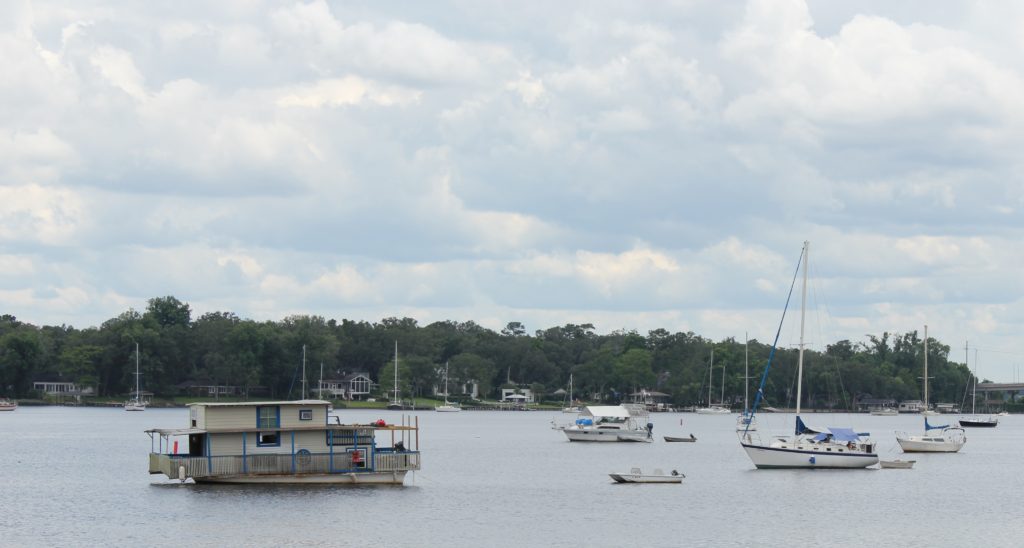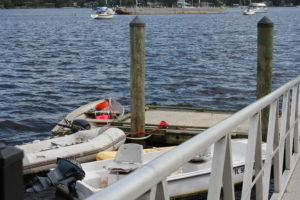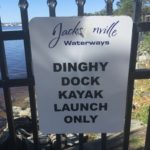Last December, the Barker family gathered around the tree on Christmas morning in the family room of their riverfront home. Homeowner Mike Barker looked out the window at the Ortega River and was met with a disgusting sight. A man who lives on a boat anchored in front of Barker’s dock was on the deck of the boat relieving himself in full view.
“There we were, getting our coffee and looking at the tree, and here’s this guy exposing himself to my wife and kids,” said Barker.
Barker didn’t bother calling law enforcement because he’s had countless conversations with them over the four years that someone’s been living on a boat in front of his house, yet nothing ever happens. Sometimes he’s been told officers need to catch a person in the act of breaking the law. Other times he’s been told the laws simply don’t exist to prevent people from anchoring and living on their boat wherever they want and for as long as they want. And sometimes the officers seem to side with the boaters. When Barker complained a few years ago about a loud generator that ran all night, keeping his family awake, the officer told him the boater was “just trying to keep warm.”
Jessica Jenkins also had problems with an anchored boat’s loud generator. She lives a mile north of Barker on the same stretch of river.
“It’s like having a lawn mower outside of your window all night long,” she posted on NextDoor Ortega.
Homeowners in the Ortega and Trout rivers have similar stories of trying to deal with problems caused by boats anchored in the rivers where it’s free to keep a boat. There are unmanned boats, transient boaters and boats being used as a primary residence.

Some boats are dumped by owners without the money, or motivation, to haul them to a junkyard. Those boats deteriorate over time, polluting the water with fuel, oil and whatever junk is left on board, eventually becoming an expensive salvage project paid for by taxpayers.
Some break free during storms, shooting like runaway freight trains into docks and other boats. Since homeowner’s insurance doesn’t cover docks, and many anchored boats are uninsured, a homeowner ends up paying out-of-pocket for damage that can easily run into the tens of thousands.
Lines can snap on even a well-maintained boat, but on a neglected boat, it’s just a matter of time, boaters say. Or a boat can break free from its anchor, leaving the anchor and a portion of line on the river bed. The line can then get caught in another boat’s propeller, doing hundreds, if not thousands, of dollars in damage.
Then there are the “liveaboards” – people living on boats whose conditions range from well-maintained to ramshackle jalopies. A few liveaboards have been in the Ortega River for more than a year, raising questions about sewage disposal in an area that has commercial crab traps, recreational fishing and water skiing.
But it’s not just a Jacksonville problem; anchoring conflicts are going on all over the state of Florida and throughout the country. The problem is on the rise, officials say, though no one seems sure sure why.
Miami, the Keys, St. Augustine, Boynton Beach, Palm Beach, Daytona Beach and Apalachicola all have been grappling with anchoring issues. In Apalachicola, once famous for its oyster industry, a University of Florida study reported 177 boats moored in the river with people living on them.

There are similar stories in Oregon, California and Alaska. North Carolina has had problems in lakes in addition to rivers.
Media coverage in all of these places is remarkably similar. Homeowners and marina owners are fed up with the pollution, noise, cluttered waterways and damage done by vessels moored in open water.
But overlapping federal, state and local jurisdictions leave citizens who complain feeling like they’re getting the runaround.
Officials all over the country are trying to figure out a plan to cope with complaints. In Miami, tension between residents and boaters has almost come to violence.
Not all liveaboards pose problems. Some liveaboard vessels, defined by Florida statute as a vessel used as a residence and not for navigation, are docked at marinas who have pump-out stations for sewage. Some boaters are only living aboard a boat temporarily as they travel the country’s waterways. Called “cruisers,” they’ll often anchor for a short period of time in a city in order to shop, use laundry facilities or make repairs. Both of the above class of boaters generally maintain their boats, have insurance, and are respectful of the waterways, say local residents.

Until recently, Florida cities and counties had a hodgepodge of laws and ordinances that made it difficult for cruisers, or even boaters just wanting to anchor overnight, to know what jurisdiction they were in and to comply with the law. So major boating organizations banded together in 2009 and got the Florida Legislature to strip local governments’ power to regulate anchoring.
The problem is it didn’t just open the waterways up for responsible boaters, it opened them up for those who abandon boats, for derelict boats, and for amateur boaters who don’t anchor properly but then aren’t held responsible for damage their boat causes. And it provided carte blanche for the liveaboards in decrepit vessels that either can’t afford a marina or wouldn’t be accepted by one to anchor wherever they please.
BoatUS is one of the largest and most vocal boaters’ groups, boasting 500,000 members. Together with the National Marine Manufacturers Association, Seven Seas Cruising Association, the Marine Trawler Owners Association and the American Great Loop Cruisers Association, they monitor boating legislation and then alert their members to contact lawmakers to discourage them from enacting anchoring regulations.
They even opposed Florida laws passed in June 2016 tightening up the definitions of At Risk and Derelict vessels that law enforcement claims it needed to head off problem boats before they damage the environment or property.
In Jacksonville, concerns about sewage, property damage and derelict boats in the Ortega River goes back at least to 2003, when Waterways Commissioner Bronson Lamb, Jr. expressed concern over “anchorage; lighting; and the discharge of raw sewage.” Fifteen years later, residents and marina owners are still trying to get law enforcement to deal with the problems, although the city did create a channel in one section of the Ortega River where anchoring isn’t allowed, in order to keep navigation clear.
Today, there are approximately five long-term liveaboards in the Ortega, several of whom who use city-owned Stinson Park as their personal dock and parking lot.
“Why are they allowed to do things with boats that we don’t allow people to do with cars?” asked Barker.
For now, there’s no answer in sight.
Florida Field Notes requested information from Florida Fish and Wildlife Commission and from the Jacksonville Sheriff’s Office Marine Patrol but has not yet had a response. We will continue to report on this topic. (Disclosure: the reporter lives in the area and has contacted law enforcement with noise complaints and to report loose vessels over a several year period.)
Update: 6/12/18 1:40 p.m. The definition of “liveaboard vessel” was updated.


4 Responses
Mildred Adicks
That is a very good article, Lisa, about a serious problem. Good that you are bring attention to it. Keep up the good work, and perhaps the authorities will eventually listen.
P.S. Congratulations on finishing your latest course in flying colors!!
J. Bernal
Your article is incorrect: “So major boating organizations banded together in 2009 and got the Florida Legislature to strip local governments’ power to regulate anchoring.”
Local governments never had the power to regulate anchoring and never will; waterways are federal territory and therefore cannot be regulated by state or local governments.
editor@floridafieldnotes.com
Thanks for your comment. Here are 2 of my sources: 1. BoatU.S. Magazine, June/July 2016: “Before 2009, boaters cruising in Florida faced a jumble of local regulations that made it difficult to know where and for how long they could drop the hook. That year, BoatU.S. and other boating groups successfully lobbied the legislature to limit local government authority to regulate anchoring outside of designated mooring fields.”
2. Florida Statute 327.4108 “Anchoring of vessels in anchoring limitation areas” and 327.4109 “Anchoring or mooring prohibited; exceptions; penalties -.”
Justin
Ironically the very boat pictured above is now derelict and half sunk in the river. It’s an environmental disaster and an eyesore. It’s a shame more can’t be done about it.